Impact of COVID-19 on Small Businesses: A Literature Review
VerifiedAdded on 2023/06/14
|8
|1908
|434
AI Summary
This literature review discusses the impact of COVID-19 on small businesses, including their response to the economic breakdown, anticipated crisis duration, and alternative policy proposals. It also explores the positive and negative effects of the pandemic on small businesses, as well as government interventions to help them.
Contribute Materials
Your contribution can guide someone’s learning journey. Share your
documents today.

Research
Secure Best Marks with AI Grader
Need help grading? Try our AI Grader for instant feedback on your assignments.
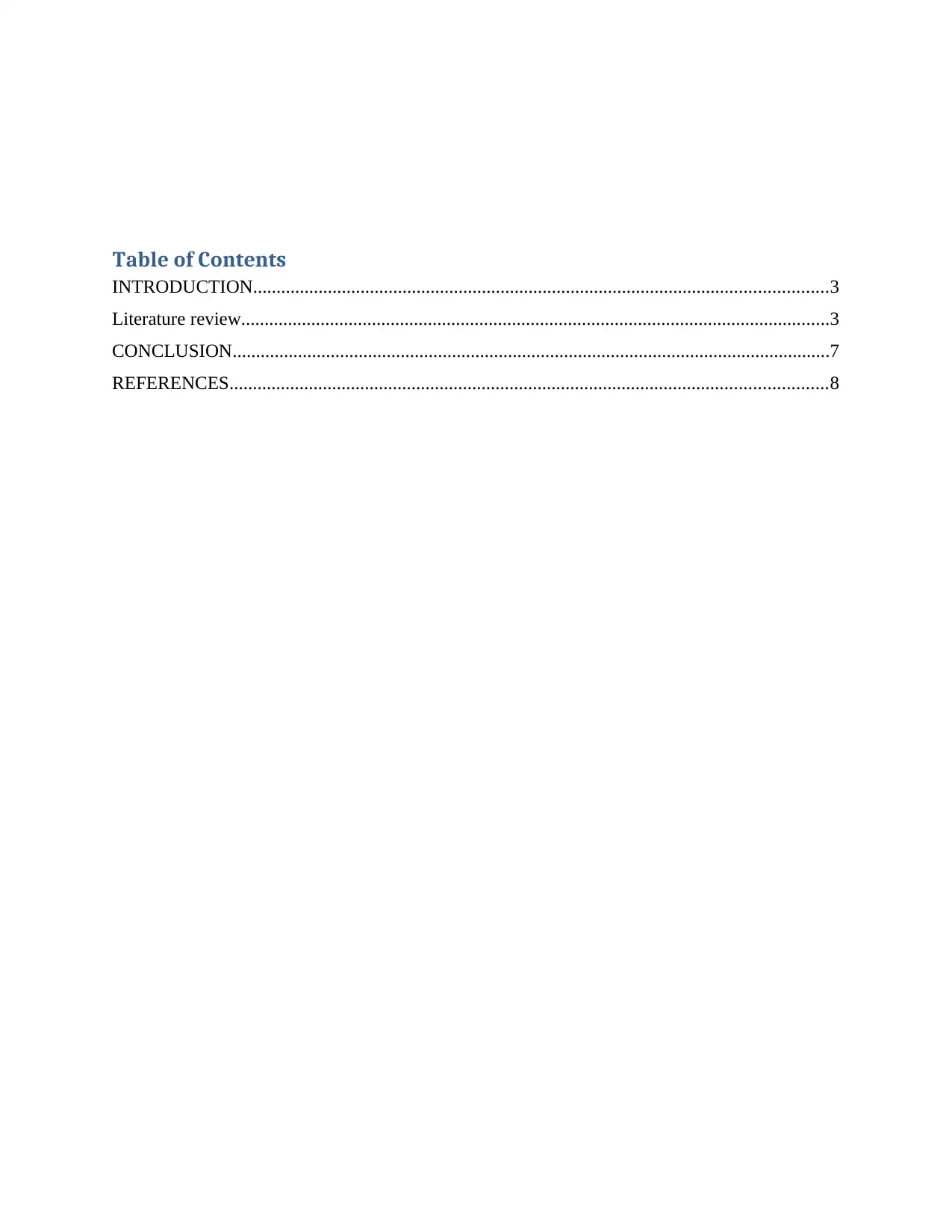
Table of Contents
INTRODUCTION...........................................................................................................................3
Literature review..............................................................................................................................3
CONCLUSION................................................................................................................................7
REFERENCES................................................................................................................................8
INTRODUCTION...........................................................................................................................3
Literature review..............................................................................................................................3
CONCLUSION................................................................................................................................7
REFERENCES................................................................................................................................8
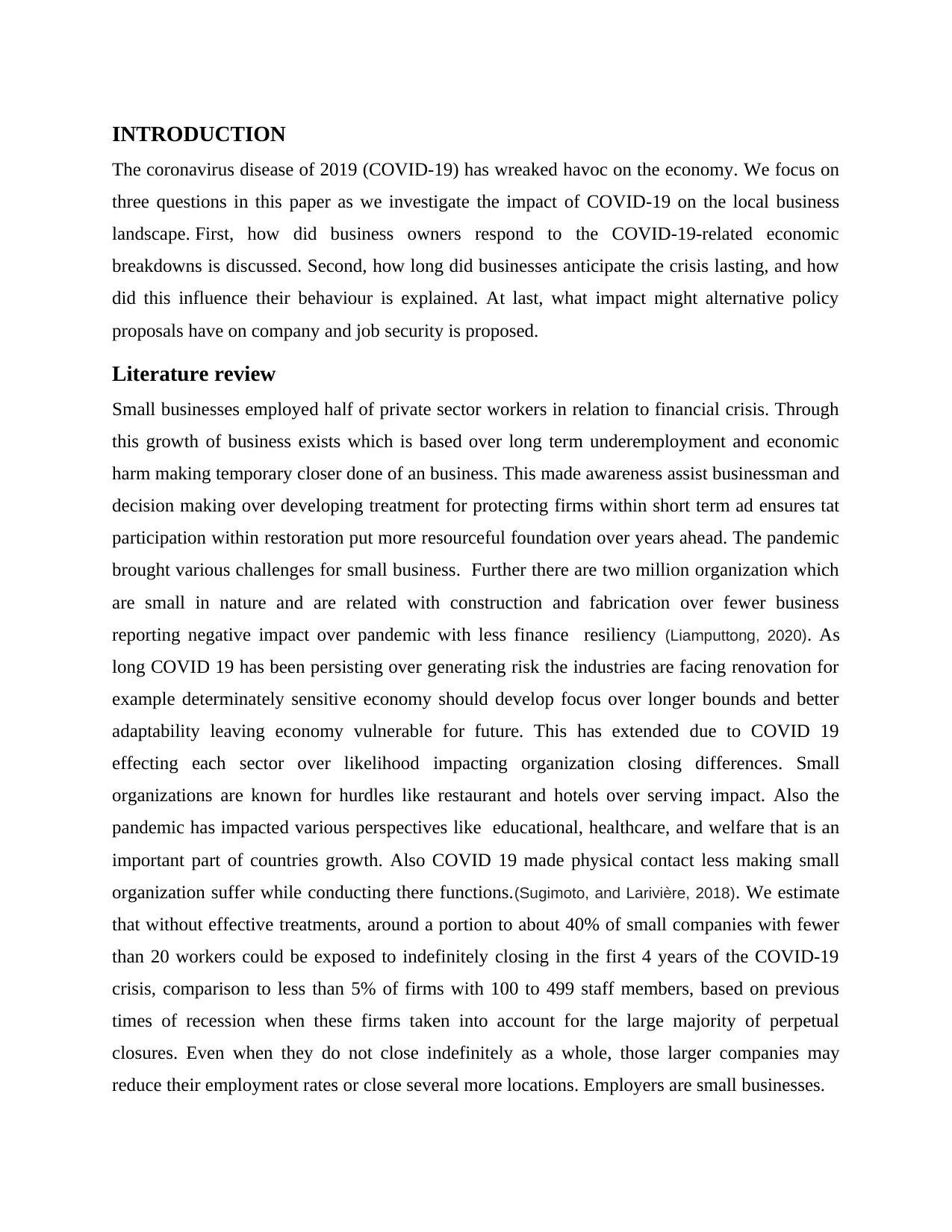
INTRODUCTION
The coronavirus disease of 2019 (COVID-19) has wreaked havoc on the economy. We focus on
three questions in this paper as we investigate the impact of COVID-19 on the local business
landscape. First, how did business owners respond to the COVID-19-related economic
breakdowns is discussed. Second, how long did businesses anticipate the crisis lasting, and how
did this influence their behaviour is explained. At last, what impact might alternative policy
proposals have on company and job security is proposed.
Literature review
Small businesses employed half of private sector workers in relation to financial crisis. Through
this growth of business exists which is based over long term underemployment and economic
harm making temporary closer done of an business. This made awareness assist businessman and
decision making over developing treatment for protecting firms within short term ad ensures tat
participation within restoration put more resourceful foundation over years ahead. The pandemic
brought various challenges for small business. Further there are two million organization which
are small in nature and are related with construction and fabrication over fewer business
reporting negative impact over pandemic with less finance resiliency (Liamputtong, 2020). As
long COVID 19 has been persisting over generating risk the industries are facing renovation for
example determinately sensitive economy should develop focus over longer bounds and better
adaptability leaving economy vulnerable for future. This has extended due to COVID 19
effecting each sector over likelihood impacting organization closing differences. Small
organizations are known for hurdles like restaurant and hotels over serving impact. Also the
pandemic has impacted various perspectives like educational, healthcare, and welfare that is an
important part of countries growth. Also COVID 19 made physical contact less making small
organization suffer while conducting there functions.(Sugimoto, and Larivière, 2018). We estimate
that without effective treatments, around a portion to about 40% of small companies with fewer
than 20 workers could be exposed to indefinitely closing in the first 4 years of the COVID-19
crisis, comparison to less than 5% of firms with 100 to 499 staff members, based on previous
times of recession when these firms taken into account for the large majority of perpetual
closures. Even when they do not close indefinitely as a whole, those larger companies may
reduce their employment rates or close several more locations. Employers are small businesses.
The coronavirus disease of 2019 (COVID-19) has wreaked havoc on the economy. We focus on
three questions in this paper as we investigate the impact of COVID-19 on the local business
landscape. First, how did business owners respond to the COVID-19-related economic
breakdowns is discussed. Second, how long did businesses anticipate the crisis lasting, and how
did this influence their behaviour is explained. At last, what impact might alternative policy
proposals have on company and job security is proposed.
Literature review
Small businesses employed half of private sector workers in relation to financial crisis. Through
this growth of business exists which is based over long term underemployment and economic
harm making temporary closer done of an business. This made awareness assist businessman and
decision making over developing treatment for protecting firms within short term ad ensures tat
participation within restoration put more resourceful foundation over years ahead. The pandemic
brought various challenges for small business. Further there are two million organization which
are small in nature and are related with construction and fabrication over fewer business
reporting negative impact over pandemic with less finance resiliency (Liamputtong, 2020). As
long COVID 19 has been persisting over generating risk the industries are facing renovation for
example determinately sensitive economy should develop focus over longer bounds and better
adaptability leaving economy vulnerable for future. This has extended due to COVID 19
effecting each sector over likelihood impacting organization closing differences. Small
organizations are known for hurdles like restaurant and hotels over serving impact. Also the
pandemic has impacted various perspectives like educational, healthcare, and welfare that is an
important part of countries growth. Also COVID 19 made physical contact less making small
organization suffer while conducting there functions.(Sugimoto, and Larivière, 2018). We estimate
that without effective treatments, around a portion to about 40% of small companies with fewer
than 20 workers could be exposed to indefinitely closing in the first 4 years of the COVID-19
crisis, comparison to less than 5% of firms with 100 to 499 staff members, based on previous
times of recession when these firms taken into account for the large majority of perpetual
closures. Even when they do not close indefinitely as a whole, those larger companies may
reduce their employment rates or close several more locations. Employers are small businesses.
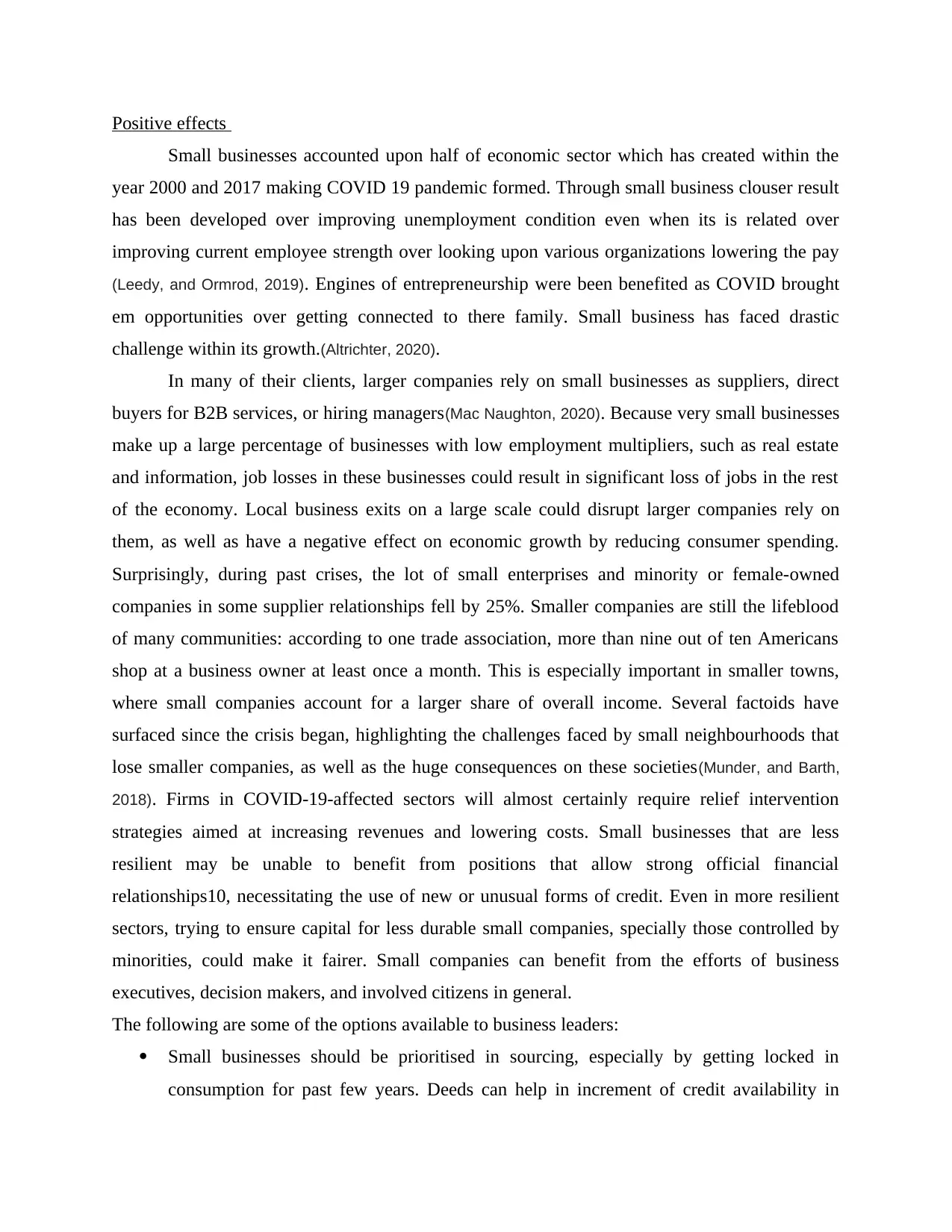
Positive effects
Small businesses accounted upon half of economic sector which has created within the
year 2000 and 2017 making COVID 19 pandemic formed. Through small business clouser result
has been developed over improving unemployment condition even when its is related over
improving current employee strength over looking upon various organizations lowering the pay
(Leedy, and Ormrod, 2019). Engines of entrepreneurship were been benefited as COVID brought
em opportunities over getting connected to there family. Small business has faced drastic
challenge within its growth.(Altrichter, 2020).
In many of their clients, larger companies rely on small businesses as suppliers, direct
buyers for B2B services, or hiring managers(Mac Naughton, 2020). Because very small businesses
make up a large percentage of businesses with low employment multipliers, such as real estate
and information, job losses in these businesses could result in significant loss of jobs in the rest
of the economy. Local business exits on a large scale could disrupt larger companies rely on
them, as well as have a negative effect on economic growth by reducing consumer spending.
Surprisingly, during past crises, the lot of small enterprises and minority or female-owned
companies in some supplier relationships fell by 25%. Smaller companies are still the lifeblood
of many communities: according to one trade association, more than nine out of ten Americans
shop at a business owner at least once a month. This is especially important in smaller towns,
where small companies account for a larger share of overall income. Several factoids have
surfaced since the crisis began, highlighting the challenges faced by small neighbourhoods that
lose smaller companies, as well as the huge consequences on these societies(Munder, and Barth,
2018). Firms in COVID-19-affected sectors will almost certainly require relief intervention
strategies aimed at increasing revenues and lowering costs. Small businesses that are less
resilient may be unable to benefit from positions that allow strong official financial
relationships10, necessitating the use of new or unusual forms of credit. Even in more resilient
sectors, trying to ensure capital for less durable small companies, specially those controlled by
minorities, could make it fairer. Small companies can benefit from the efforts of business
executives, decision makers, and involved citizens in general.
The following are some of the options available to business leaders:
Small businesses should be prioritised in sourcing, especially by getting locked in
consumption for past few years. Deeds can help in increment of credit availability in
Small businesses accounted upon half of economic sector which has created within the
year 2000 and 2017 making COVID 19 pandemic formed. Through small business clouser result
has been developed over improving unemployment condition even when its is related over
improving current employee strength over looking upon various organizations lowering the pay
(Leedy, and Ormrod, 2019). Engines of entrepreneurship were been benefited as COVID brought
em opportunities over getting connected to there family. Small business has faced drastic
challenge within its growth.(Altrichter, 2020).
In many of their clients, larger companies rely on small businesses as suppliers, direct
buyers for B2B services, or hiring managers(Mac Naughton, 2020). Because very small businesses
make up a large percentage of businesses with low employment multipliers, such as real estate
and information, job losses in these businesses could result in significant loss of jobs in the rest
of the economy. Local business exits on a large scale could disrupt larger companies rely on
them, as well as have a negative effect on economic growth by reducing consumer spending.
Surprisingly, during past crises, the lot of small enterprises and minority or female-owned
companies in some supplier relationships fell by 25%. Smaller companies are still the lifeblood
of many communities: according to one trade association, more than nine out of ten Americans
shop at a business owner at least once a month. This is especially important in smaller towns,
where small companies account for a larger share of overall income. Several factoids have
surfaced since the crisis began, highlighting the challenges faced by small neighbourhoods that
lose smaller companies, as well as the huge consequences on these societies(Munder, and Barth,
2018). Firms in COVID-19-affected sectors will almost certainly require relief intervention
strategies aimed at increasing revenues and lowering costs. Small businesses that are less
resilient may be unable to benefit from positions that allow strong official financial
relationships10, necessitating the use of new or unusual forms of credit. Even in more resilient
sectors, trying to ensure capital for less durable small companies, specially those controlled by
minorities, could make it fairer. Small companies can benefit from the efforts of business
executives, decision makers, and involved citizens in general.
The following are some of the options available to business leaders:
Small businesses should be prioritised in sourcing, especially by getting locked in
consumption for past few years. Deeds can help in increment of credit availability in
Secure Best Marks with AI Grader
Need help grading? Try our AI Grader for instant feedback on your assignments.
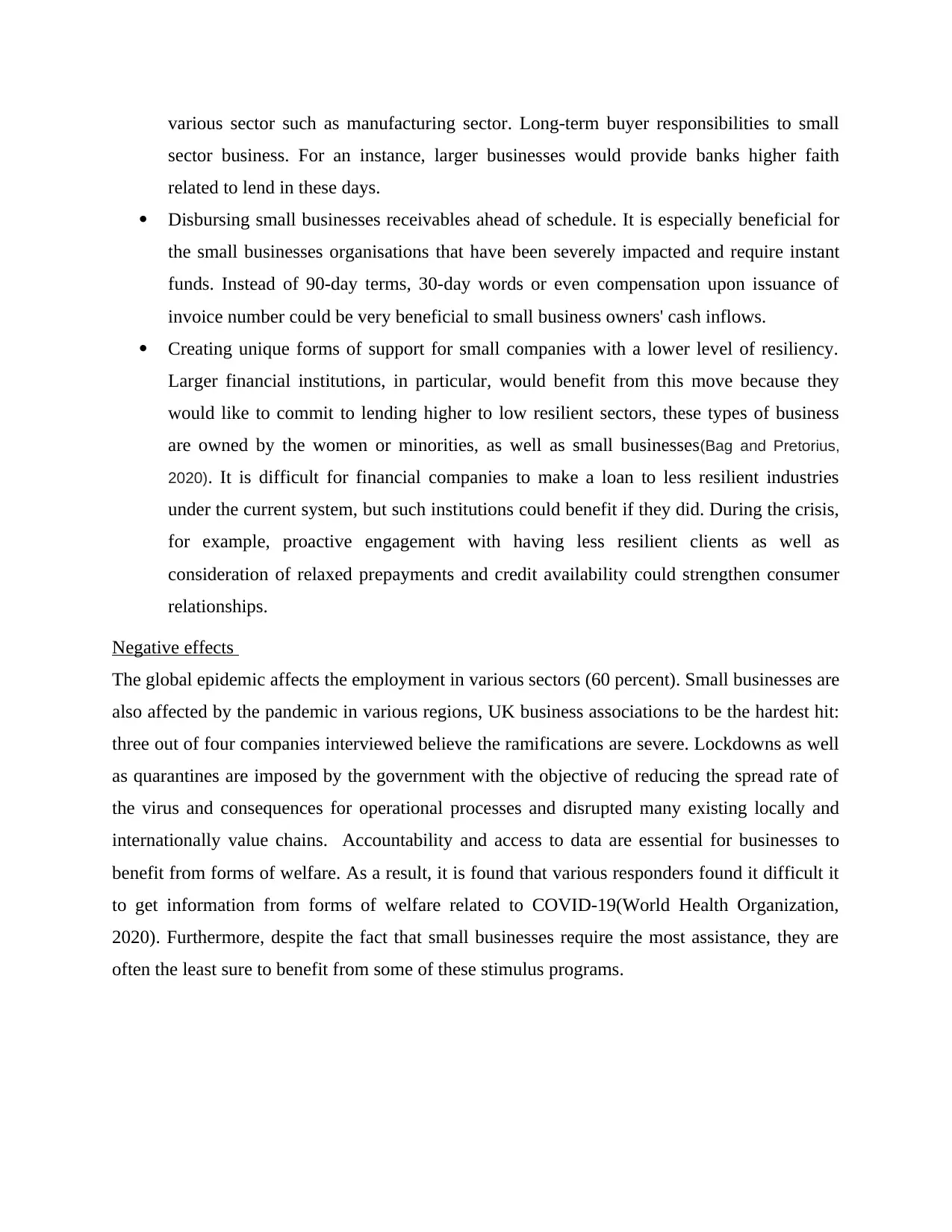
various sector such as manufacturing sector. Long-term buyer responsibilities to small
sector business. For an instance, larger businesses would provide banks higher faith
related to lend in these days.
Disbursing small businesses receivables ahead of schedule. It is especially beneficial for
the small businesses organisations that have been severely impacted and require instant
funds. Instead of 90-day terms, 30-day words or even compensation upon issuance of
invoice number could be very beneficial to small business owners' cash inflows.
Creating unique forms of support for small companies with a lower level of resiliency.
Larger financial institutions, in particular, would benefit from this move because they
would like to commit to lending higher to low resilient sectors, these types of business
are owned by the women or minorities, as well as small businesses(Bag and Pretorius,
2020). It is difficult for financial companies to make a loan to less resilient industries
under the current system, but such institutions could benefit if they did. During the crisis,
for example, proactive engagement with having less resilient clients as well as
consideration of relaxed prepayments and credit availability could strengthen consumer
relationships.
Negative effects
The global epidemic affects the employment in various sectors (60 percent). Small businesses are
also affected by the pandemic in various regions, UK business associations to be the hardest hit:
three out of four companies interviewed believe the ramifications are severe. Lockdowns as well
as quarantines are imposed by the government with the objective of reducing the spread rate of
the virus and consequences for operational processes and disrupted many existing locally and
internationally value chains. Accountability and access to data are essential for businesses to
benefit from forms of welfare. As a result, it is found that various responders found it difficult it
to get information from forms of welfare related to COVID-19(World Health Organization,
2020). Furthermore, despite the fact that small businesses require the most assistance, they are
often the least sure to benefit from some of these stimulus programs.
sector business. For an instance, larger businesses would provide banks higher faith
related to lend in these days.
Disbursing small businesses receivables ahead of schedule. It is especially beneficial for
the small businesses organisations that have been severely impacted and require instant
funds. Instead of 90-day terms, 30-day words or even compensation upon issuance of
invoice number could be very beneficial to small business owners' cash inflows.
Creating unique forms of support for small companies with a lower level of resiliency.
Larger financial institutions, in particular, would benefit from this move because they
would like to commit to lending higher to low resilient sectors, these types of business
are owned by the women or minorities, as well as small businesses(Bag and Pretorius,
2020). It is difficult for financial companies to make a loan to less resilient industries
under the current system, but such institutions could benefit if they did. During the crisis,
for example, proactive engagement with having less resilient clients as well as
consideration of relaxed prepayments and credit availability could strengthen consumer
relationships.
Negative effects
The global epidemic affects the employment in various sectors (60 percent). Small businesses are
also affected by the pandemic in various regions, UK business associations to be the hardest hit:
three out of four companies interviewed believe the ramifications are severe. Lockdowns as well
as quarantines are imposed by the government with the objective of reducing the spread rate of
the virus and consequences for operational processes and disrupted many existing locally and
internationally value chains. Accountability and access to data are essential for businesses to
benefit from forms of welfare. As a result, it is found that various responders found it difficult it
to get information from forms of welfare related to COVID-19(World Health Organization,
2020). Furthermore, despite the fact that small businesses require the most assistance, they are
often the least sure to benefit from some of these stimulus programs.
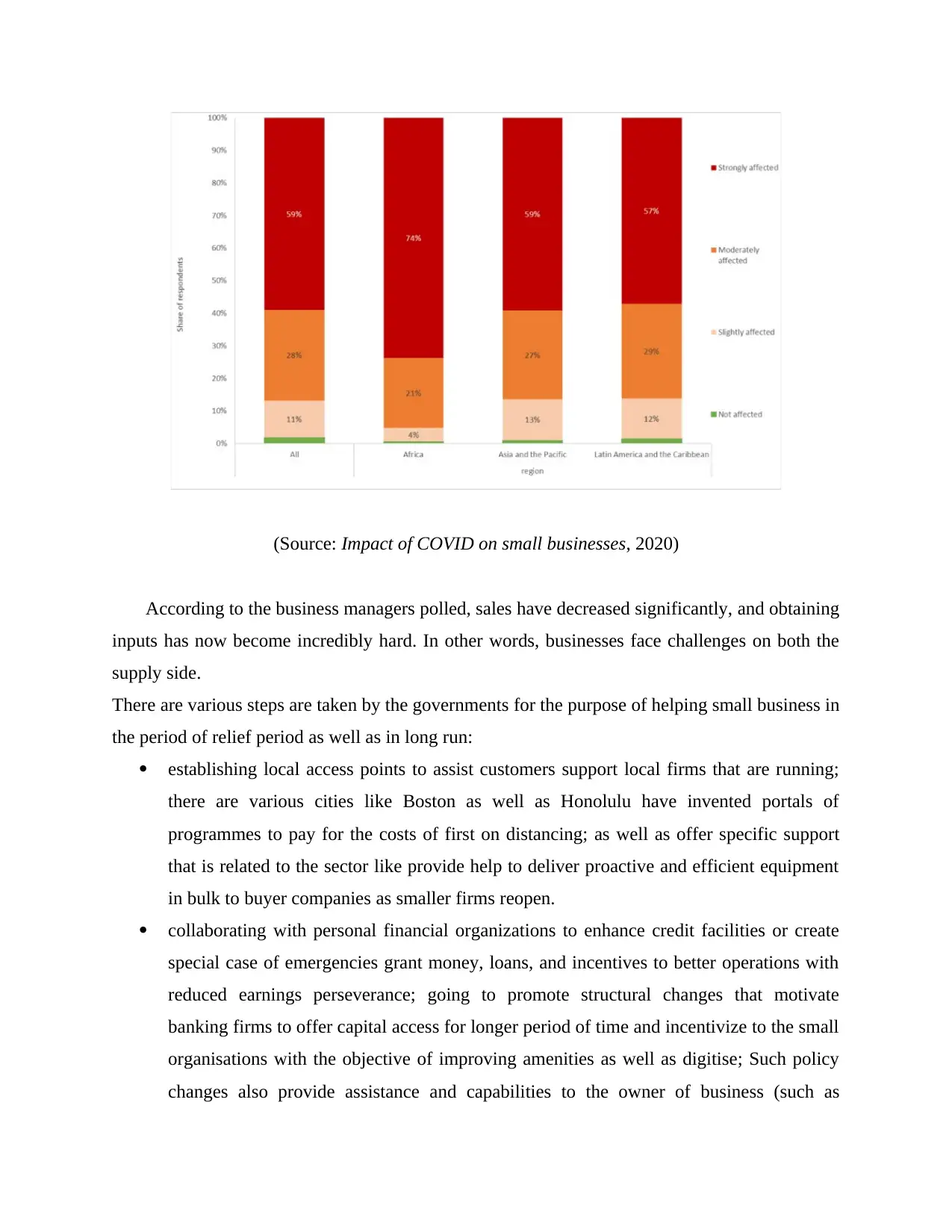
(Source: Impact of COVID on small businesses, 2020)
According to the business managers polled, sales have decreased significantly, and obtaining
inputs has now become incredibly hard. In other words, businesses face challenges on both the
supply side.
There are various steps are taken by the governments for the purpose of helping small business in
the period of relief period as well as in long run:
establishing local access points to assist customers support local firms that are running;
there are various cities like Boston as well as Honolulu have invented portals of
programmes to pay for the costs of first on distancing; as well as offer specific support
that is related to the sector like provide help to deliver proactive and efficient equipment
in bulk to buyer companies as smaller firms reopen.
collaborating with personal financial organizations to enhance credit facilities or create
special case of emergencies grant money, loans, and incentives to better operations with
reduced earnings perseverance; going to promote structural changes that motivate
banking firms to offer capital access for longer period of time and incentivize to the small
organisations with the objective of improving amenities as well as digitise; Such policy
changes also provide assistance and capabilities to the owner of business (such as
According to the business managers polled, sales have decreased significantly, and obtaining
inputs has now become incredibly hard. In other words, businesses face challenges on both the
supply side.
There are various steps are taken by the governments for the purpose of helping small business in
the period of relief period as well as in long run:
establishing local access points to assist customers support local firms that are running;
there are various cities like Boston as well as Honolulu have invented portals of
programmes to pay for the costs of first on distancing; as well as offer specific support
that is related to the sector like provide help to deliver proactive and efficient equipment
in bulk to buyer companies as smaller firms reopen.
collaborating with personal financial organizations to enhance credit facilities or create
special case of emergencies grant money, loans, and incentives to better operations with
reduced earnings perseverance; going to promote structural changes that motivate
banking firms to offer capital access for longer period of time and incentivize to the small
organisations with the objective of improving amenities as well as digitise; Such policy
changes also provide assistance and capabilities to the owner of business (such as
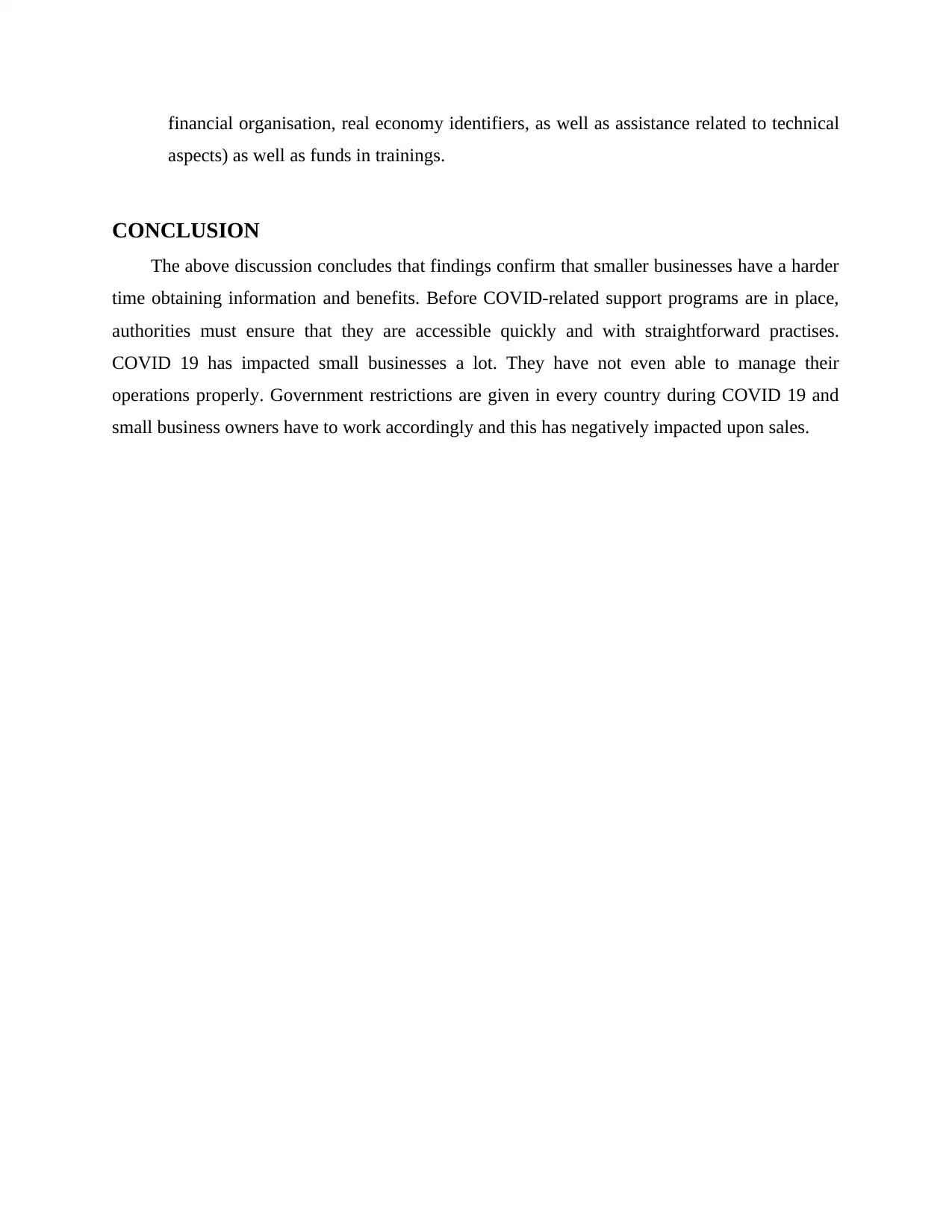
financial organisation, real economy identifiers, as well as assistance related to technical
aspects) as well as funds in trainings.
CONCLUSION
The above discussion concludes that findings confirm that smaller businesses have a harder
time obtaining information and benefits. Before COVID-related support programs are in place,
authorities must ensure that they are accessible quickly and with straightforward practises.
COVID 19 has impacted small businesses a lot. They have not even able to manage their
operations properly. Government restrictions are given in every country during COVID 19 and
small business owners have to work accordingly and this has negatively impacted upon sales.
aspects) as well as funds in trainings.
CONCLUSION
The above discussion concludes that findings confirm that smaller businesses have a harder
time obtaining information and benefits. Before COVID-related support programs are in place,
authorities must ensure that they are accessible quickly and with straightforward practises.
COVID 19 has impacted small businesses a lot. They have not even able to manage their
operations properly. Government restrictions are given in every country during COVID 19 and
small business owners have to work accordingly and this has negatively impacted upon sales.
Paraphrase This Document
Need a fresh take? Get an instant paraphrase of this document with our AI Paraphraser
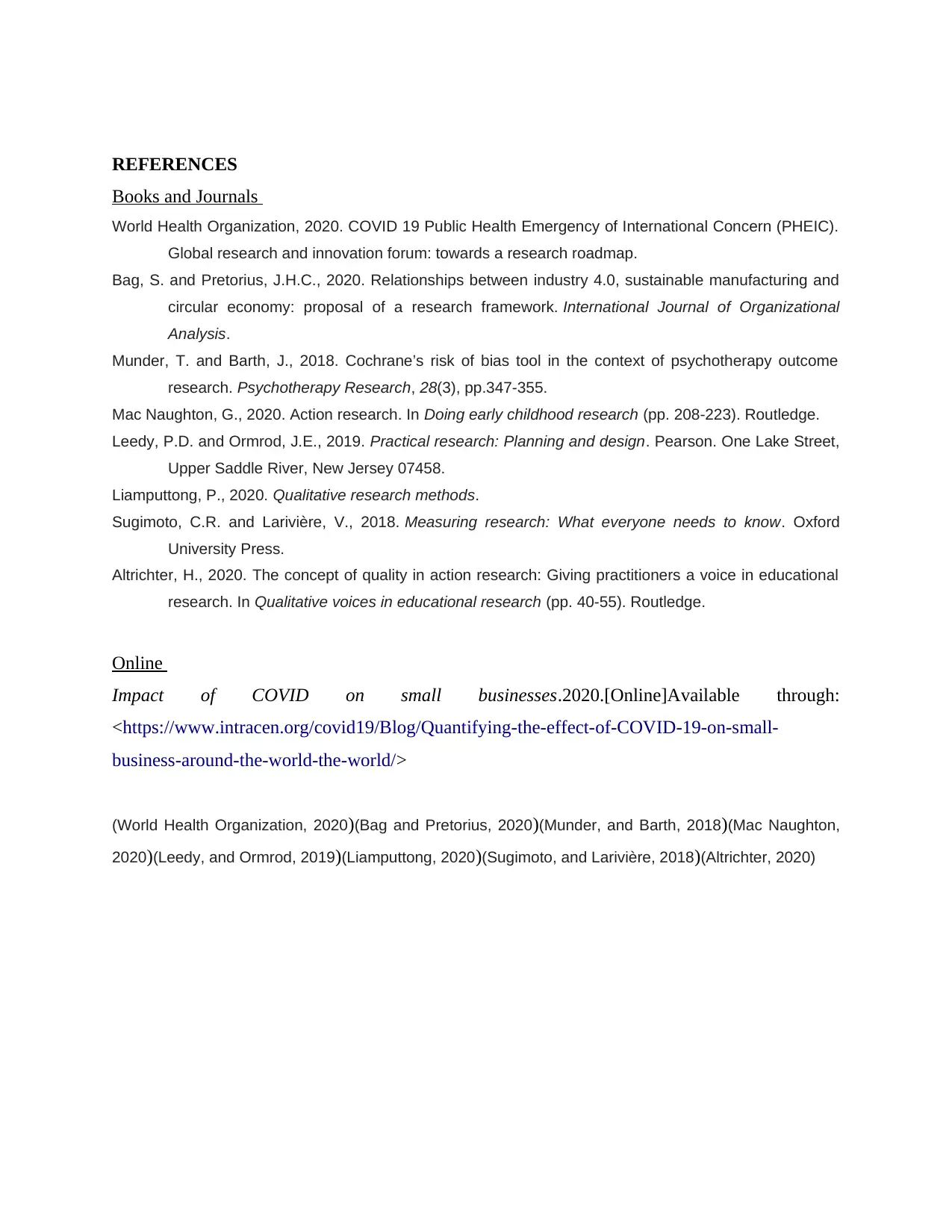
REFERENCES
Books and Journals
World Health Organization, 2020. COVID 19 Public Health Emergency of International Concern (PHEIC).
Global research and innovation forum: towards a research roadmap.
Bag, S. and Pretorius, J.H.C., 2020. Relationships between industry 4.0, sustainable manufacturing and
circular economy: proposal of a research framework. International Journal of Organizational
Analysis.
Munder, T. and Barth, J., 2018. Cochrane’s risk of bias tool in the context of psychotherapy outcome
research. Psychotherapy Research, 28(3), pp.347-355.
Mac Naughton, G., 2020. Action research. In Doing early childhood research (pp. 208-223). Routledge.
Leedy, P.D. and Ormrod, J.E., 2019. Practical research: Planning and design. Pearson. One Lake Street,
Upper Saddle River, New Jersey 07458.
Liamputtong, P., 2020. Qualitative research methods.
Sugimoto, C.R. and Larivière, V., 2018. Measuring research: What everyone needs to know. Oxford
University Press.
Altrichter, H., 2020. The concept of quality in action research: Giving practitioners a voice in educational
research. In Qualitative voices in educational research (pp. 40-55). Routledge.
Online
Impact of COVID on small businesses.2020.[Online]Available through:
<https://www.intracen.org/covid19/Blog/Quantifying-the-effect-of-COVID-19-on-small-
business-around-the-world-the-world/>
(World Health Organization, 2020)(Bag and Pretorius, 2020)(Munder, and Barth, 2018)(Mac Naughton,
2020)(Leedy, and Ormrod, 2019)(Liamputtong, 2020)(Sugimoto, and Larivière, 2018)(Altrichter, 2020)
Books and Journals
World Health Organization, 2020. COVID 19 Public Health Emergency of International Concern (PHEIC).
Global research and innovation forum: towards a research roadmap.
Bag, S. and Pretorius, J.H.C., 2020. Relationships between industry 4.0, sustainable manufacturing and
circular economy: proposal of a research framework. International Journal of Organizational
Analysis.
Munder, T. and Barth, J., 2018. Cochrane’s risk of bias tool in the context of psychotherapy outcome
research. Psychotherapy Research, 28(3), pp.347-355.
Mac Naughton, G., 2020. Action research. In Doing early childhood research (pp. 208-223). Routledge.
Leedy, P.D. and Ormrod, J.E., 2019. Practical research: Planning and design. Pearson. One Lake Street,
Upper Saddle River, New Jersey 07458.
Liamputtong, P., 2020. Qualitative research methods.
Sugimoto, C.R. and Larivière, V., 2018. Measuring research: What everyone needs to know. Oxford
University Press.
Altrichter, H., 2020. The concept of quality in action research: Giving practitioners a voice in educational
research. In Qualitative voices in educational research (pp. 40-55). Routledge.
Online
Impact of COVID on small businesses.2020.[Online]Available through:
<https://www.intracen.org/covid19/Blog/Quantifying-the-effect-of-COVID-19-on-small-
business-around-the-world-the-world/>
(World Health Organization, 2020)(Bag and Pretorius, 2020)(Munder, and Barth, 2018)(Mac Naughton,
2020)(Leedy, and Ormrod, 2019)(Liamputtong, 2020)(Sugimoto, and Larivière, 2018)(Altrichter, 2020)
1 out of 8
Your All-in-One AI-Powered Toolkit for Academic Success.
+13062052269
info@desklib.com
Available 24*7 on WhatsApp / Email
![[object Object]](/_next/static/media/star-bottom.7253800d.svg)
Unlock your academic potential
© 2024 | Zucol Services PVT LTD | All rights reserved.




